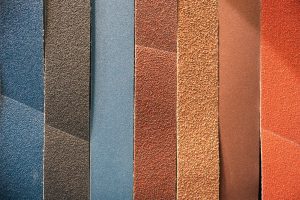Kayson Green Talks Abrasive Papers
Abrasive papers are single sheets of paper or cloth that have been coated with abrasive material on one side. Abrasive papers are used in a number of industries such as woodworking, metalworking, jewellery manufacturing and car maintenance. In all cases, an abrasive paper is used to smooth down rough surfaces and give it a polished look. The two main types of abrasive paper used in industrial settings are sandpaper (or glasspaper) and emery paper, each having its own variations when it comes to grit and bonding material.
Here is our guide on the differences between these types of abrasive papers, where they are used, and the different grit sizes for each.

What is Sandpaper?
Sandpaper or glasspaper is a common form of abrasive paper used for smoothing and polishing soft materials such as plastic, leather and wood. As it is meant for softer materials, the abrasive materials used in sandpaper are often soft stones and minerals such as flint, garnet and quartz. Sandpaper is often used in woodworking and carpentry, and can be used for tasks such as removing old paint and grit from walls when renovating buildings.
What is Emery Paper?
In contrast to sandpaper, emery paper is used for smoothing and polishing harder materials such as metal and jewellery. Emery, also known as corundite, is hard, naturally occurring rock that is only slightly less hard than diamond. As such, it is the perfect abrasive material for rubbing, polishing and removing excess defects from metal parts. Emery paper is commonly used in metalworking, watch and jewellery making, plus car manufacturing and maintenance.
Abrasive Grits & Grading
For both kinds of abrasive paper, it is important to understand what the different grit grades mean and how they work. The grit number is determined by how many abrasive particles there are per square inch on the paper. The lower the grit number, the larger the grain size and the coarser the abrasive sheet is, while higher grit numbers indicate smaller, finer abrasive grains. An abrasive paper with a grit number of 40 is very coarse and would be used to remove a large amount of excess material from a workpiece. At the other end of the scale, a grit number of 240 is very fine and ideal for polishing and finishing where small amounts of material need to be removed.
Kayson Green
Here at Kayson Green, we supply and deliver a range of abrasive solutions made by leading European manufacturers. Our line of products is used in a number of industries including aerospace, medicine, and automobile manufacturing. Our selection includes grinding wheels, honing and superfinishing stones, polishing films and more. Take a look at our range of high-quality abrasive products today and get in touch with us if you would like more information on what we offer
Browse Products Call +44 (0)1206 751500 Email sales@kaysongreen.co.uk